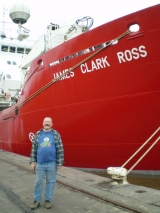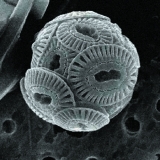Understanding Our Oceans through Research and Education ...from microbial processes to global ecosystems
Understanding Our Oceans through Research and Education ...sharing our discoveries with the wider world
Understanding Our Oceans through Research and Education ...opening new frontiers of scientific inquiry
Understanding Our Oceans through Research and Education ...a spirit of scientific freedom, creativity, and collaboration
Understanding Our Oceans through Research and Education ...the largest living library of marine phytoplankton in the world
Bigelow Laboratory for Ocean Sciences conducts research on topics ranging from microbial oceanography at the molecular level to the processes driving global ocean ecosystems.

Laboratory Researcher Aboard the Atlantic Meridional Transect
Bigelow Research Associate Bruce Bowler is currently aboard the British Antarctic research ship RSS James Clark Ross for its latest Atlantic Meridional Transect (AMT18) expedition between the United Kingdom and the Falkland Islands in South America. AMT 18 is part of a long-running international at-sea observation program that is monitoring changes in biodiversity and ecosystem processes over more than five weeks and 7,200 nautical miles through the Atlantic Ocean.

Discovery of Oceanic Cheshire Cat Behavior Receives International Attention
Senior Research Scientist Dr. Willie Wilson recently co-authored a paper with scientists from France, Portugal, and the United Kingdom that reveals a sophisticated, "Cheshire cat-like" disappearing act that Emiliana huxleyi, a chalk-covered microscopic species of marine phytoplankton, uses to escape viral infection at key times during its life cycle. The paper first appeared in the Proceedings of the National Academy of Sciences in mid-October (PNAS October 14, 2008 vol. 105 no. 41 15944-15949) and has been highlighted in a number of publications since, including the Russian edition of Newsweek magazine (06.10–12.10.2008, p. 46) and Planet Earth, the monthly Natural Environment Research Council publication from Great Britain. Emiliana huxleyi is one of the most abundant algae in the ocean and plays a major role in drawing down vast volumes of carbon dioxide from the atmosphere during its growth. (Scanning electron microscope photo of E. huxleyi courtesy of Dr. Dolors Blasco, Institute de Ciencias del Mar, Barcelona, Spain.)

The Arctic Summer Cloud Ocean Study (ASCOS)
Bigelow scientists have recently returned from a month-long mission to the high Arctic Ocean aboard the icebreaker Oden to investigate the physical processes leading to cloud formation in this critically-important global region. The Arctic Summer Cloud Ocean Study (ASCOS) is a collaboration between oceanographers, chemists, biologists, and meteorologists. The expedition was funded by the Swedish Research Council, Formas, and the Knut and Alice Wallenberg Foundation in Sweden; by the Euopean Union; and by the National Science Foundation in the United States. Listen to Maine Public Radio's interview with team leader Dr. Paty Matrai from above the Arctic Circle, and read the cruise blog from the expedition.
News
- Visiting Scientists Begin Intensive Phytoplankton Course
Scientists from seven states, Pakistan, and Australia are participating in an intensive training course taught by Robert Andersen and Michael Sieracki at Bigelow Laboratory in basic and advanced techniques for growing phytoplankton cultures in the laboratory. Worldwide, there is increasing attention on growing marine phytoplankton for possible use as biofuels. - 10/23/2008 - Engineering for the Ocean: A Mindset to Look for Answers
Dr. Graham Shimmield discusses the importance of engineering advances to the future of ocean sciences in the September 2008 issue of Today\'s Engineer, the national online magazine of the professional association for the advancement of technology. - 9/11/2008 - Deep Underwater and Deep in Space: August 26 Café Scientifique Examines New Forms of Microbial Life
Senior Research Scientist Dr. David Emerson discusses the search for new forms of microbial life and his undersea research on an unusual group of microbes that use iron as a food source. - 8/18/2008